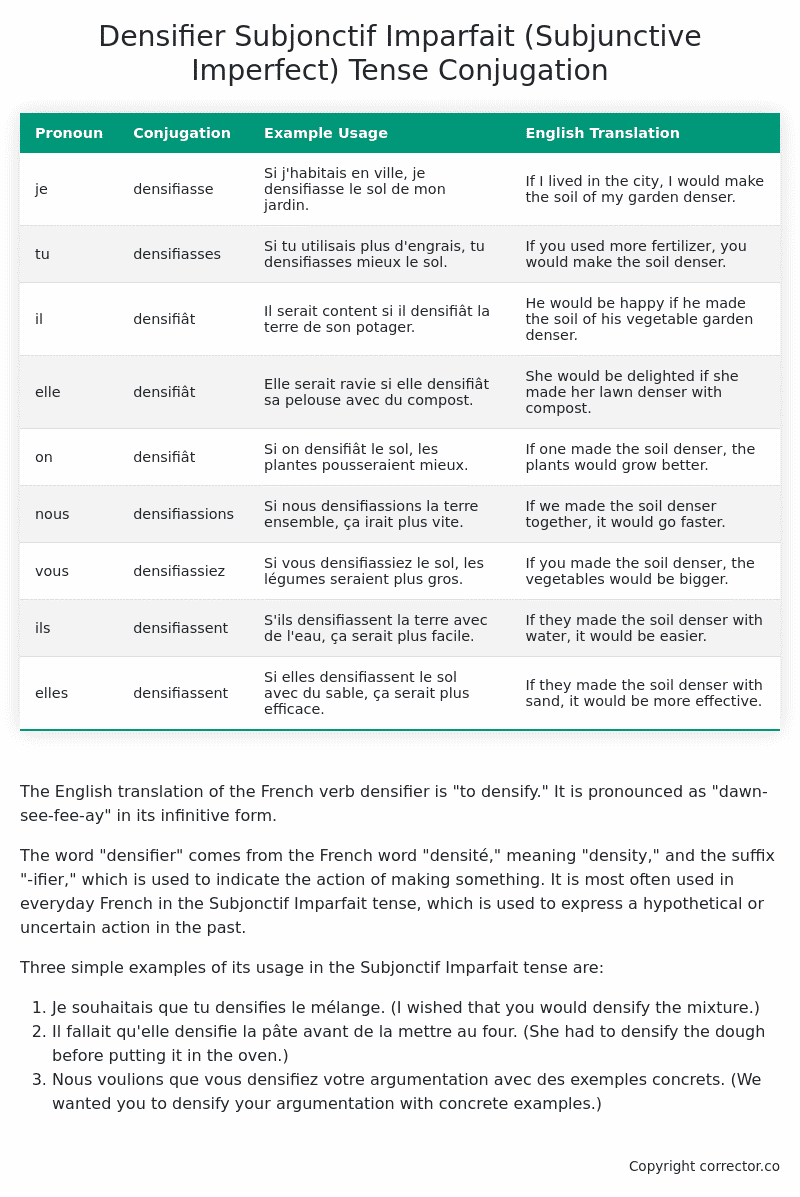Subjonctif Imparfait (Subjunctive Imperfect) Tense Conjugation of the French Verb densifier
Introduction to the verb densifier
The English translation of the French verb densifier is “to densify.” It is pronounced as “dawn-see-fee-ay” in its infinitive form.
The word “densifier” comes from the French word “densité,” meaning “density,” and the suffix “-ifier,” which is used to indicate the action of making something. It is most often used in everyday French in the Subjonctif Imparfait tense, which is used to express a hypothetical or uncertain action in the past.
Three simple examples of its usage in the Subjonctif Imparfait tense are:
- Je souhaitais que tu densifies le mélange. (I wished that you would densify the mixture.)
- Il fallait qu’elle densifie la pâte avant de la mettre au four. (She had to densify the dough before putting it in the oven.)
- Nous voulions que vous densifiez votre argumentation avec des exemples concrets. (We wanted you to densify your argumentation with concrete examples.)
Table of the Subjonctif Imparfait (Subjunctive Imperfect) Tense Conjugation of densifier
| Pronoun | Conjugation | Example Usage | English Translation |
|---|---|---|---|
| je | densifiasse | Si j’habitais en ville, je densifiasse le sol de mon jardin. | If I lived in the city, I would make the soil of my garden denser. |
| tu | densifiasses | Si tu utilisais plus d’engrais, tu densifiasses mieux le sol. | If you used more fertilizer, you would make the soil denser. |
| il | densifiât | Il serait content si il densifiât la terre de son potager. | He would be happy if he made the soil of his vegetable garden denser. |
| elle | densifiât | Elle serait ravie si elle densifiât sa pelouse avec du compost. | She would be delighted if she made her lawn denser with compost. |
| on | densifiât | Si on densifiât le sol, les plantes pousseraient mieux. | If one made the soil denser, the plants would grow better. |
| nous | densifiassions | Si nous densifiassions la terre ensemble, ça irait plus vite. | If we made the soil denser together, it would go faster. |
| vous | densifiassiez | Si vous densifiassiez le sol, les légumes seraient plus gros. | If you made the soil denser, the vegetables would be bigger. |
| ils | densifiassent | S’ils densifiassent la terre avec de l’eau, ça serait plus facile. | If they made the soil denser with water, it would be easier. |
| elles | densifiassent | Si elles densifiassent le sol avec du sable, ça serait plus efficace. | If they made the soil denser with sand, it would be more effective. |
Other Conjugations for Densifier.
Le Present (Present Tense) Conjugation of the French Verb densifier
Imparfait (Imperfect) Tense Conjugation of the French Verb densifier
Passé Simple (Simple Past) Tense Conjugation of the French Verb densifier
Passé Composé (Present Perfect) Tense Conjugation of the French Verb densifier
Futur Simple (Simple Future) Tense Conjugation of the French Verb densifier
Futur Proche (Near Future) Tense Conjugation of the French Verb densifier
Plus-que-parfait (Pluperfect) Tense Conjugation of the French Verb densifier
Passé Antérieur (Past Anterior) Tense Conjugation of the French Verb densifier
Futur Antérieur (Future Anterior) Tense Conjugation of the French Verb densifier
Subjonctif Présent (Subjunctive Present) Tense Conjugation of the French Verb densifier
Subjonctif Passé (Subjunctive Past) Tense Conjugation of the French Verb densifier
Subjonctif Imparfait (Subjunctive Imperfect) Tense Conjugation of the French Verb densifier (this article)
Subjonctif Plus-que-parfait (Subjunctive Pluperfect) Tense Conjugation of the French Verb densifier
Conditionnel Présent (Conditional Present) Tense Conjugation of the French Verb densifier
Conditionnel Passé (Conditional Past) Tense Conjugation of the French Verb densifier
L’impératif Présent (Imperative Present) Tense Conjugation of the French Verb densifier
L’infinitif Présent (Infinitive Present) Tense Conjugation of the French Verb densifier
Struggling with French verbs or the language in general? Why not use our free French Grammar Checker – no registration required!
Get a FREE Download Study Sheet of this Conjugation 🔥
Simply right click the image below, click “save image” and get your free reference for the densifier Subjonctif Imparfait tense conjugation!

Densifier – About the French Subjonctif Imparfait (Subjunctive Imperfect) Tense
Formation
Common Everyday Usage Patterns
Interactions with Other Tenses
Subjonctif Présent
Indicatif Passé Composé
Conditional
Conditional Perfect
Summary
I hope you enjoyed this article on the verb densifier. Still in a learning mood? Check out another TOTALLY random French verb conjugation!


